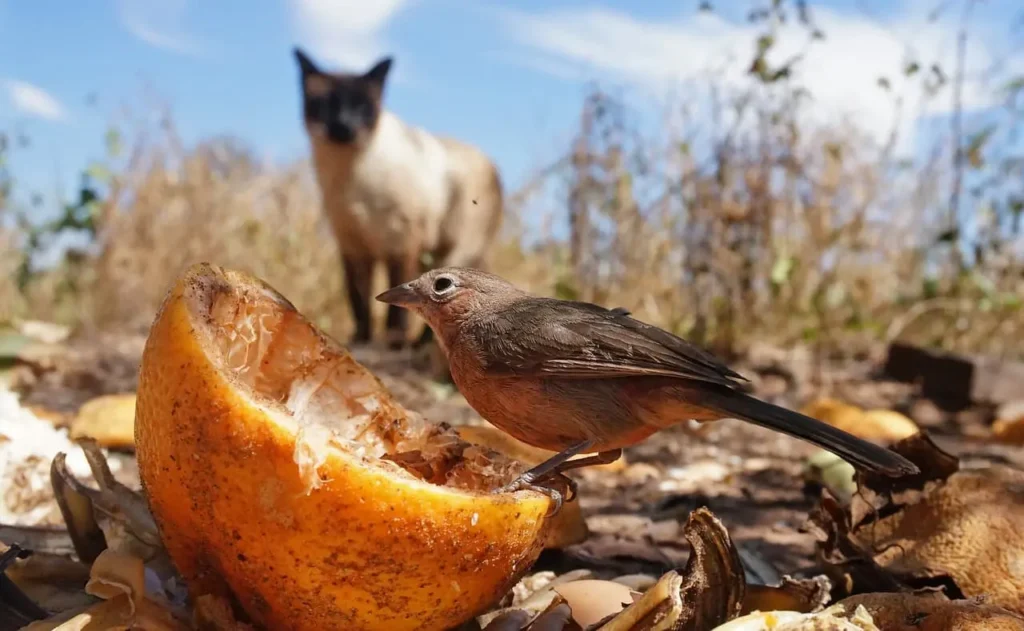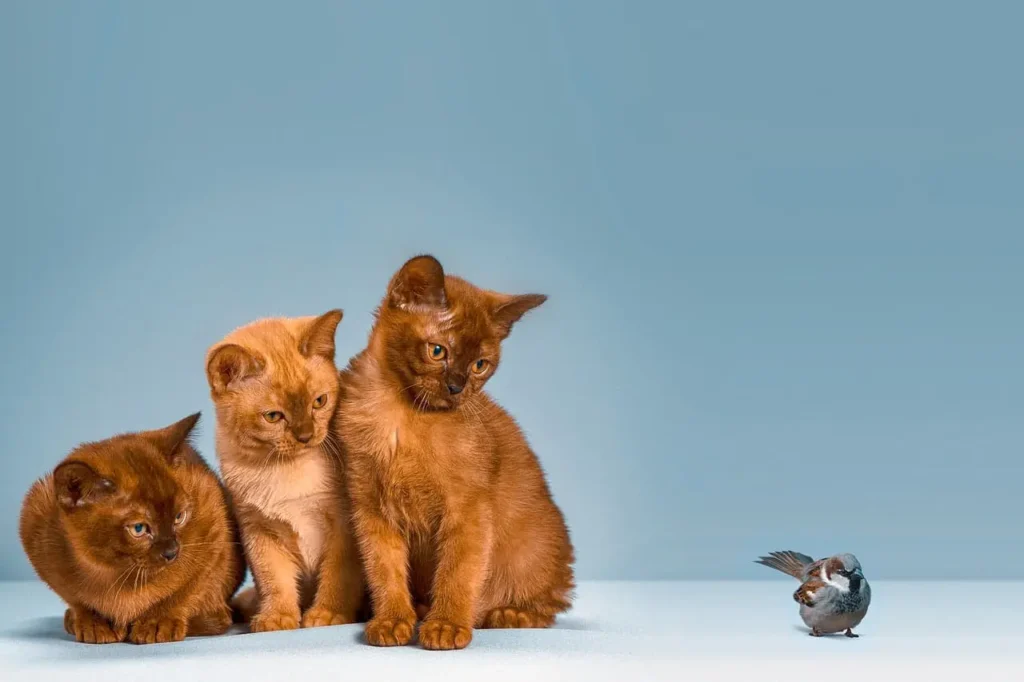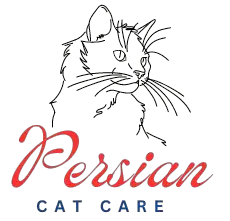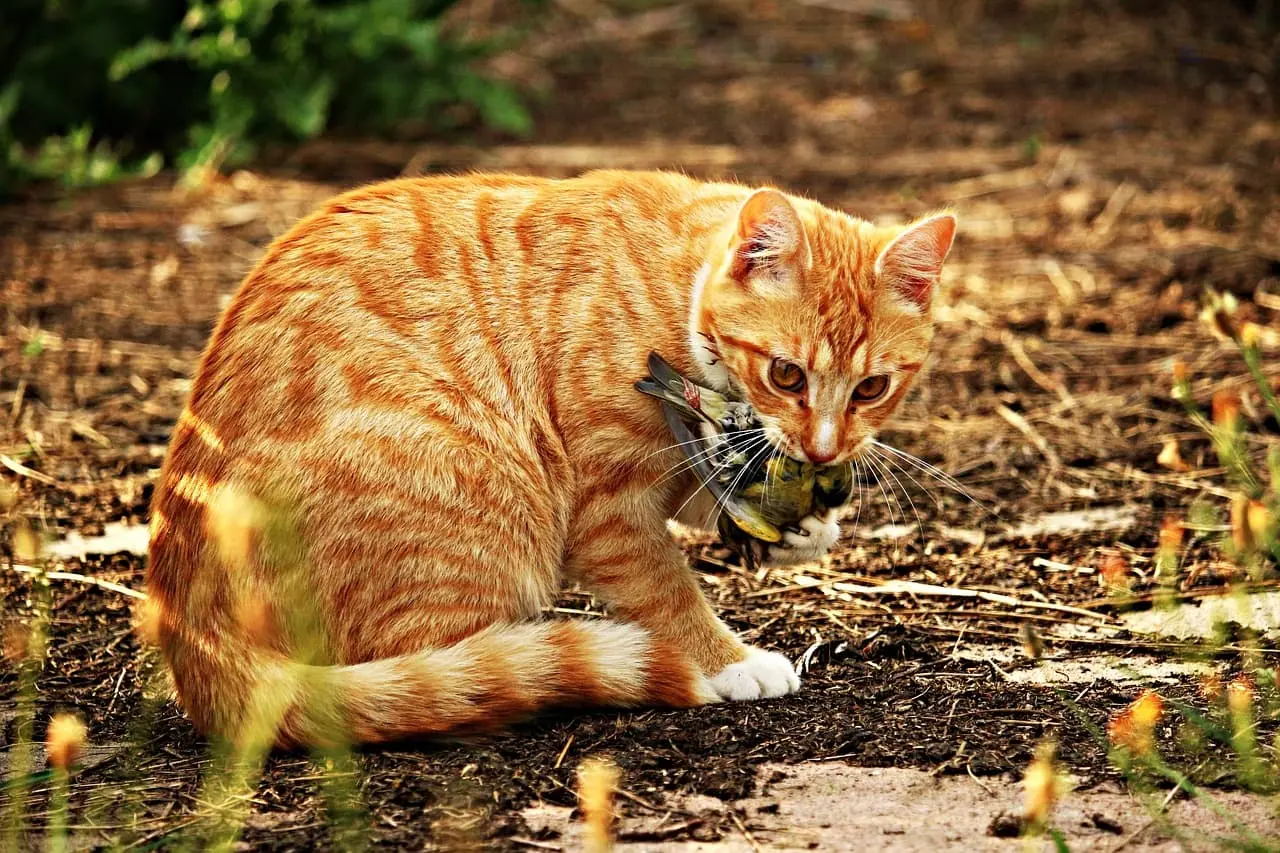In the complex ecosystem of predator and prey, the phenomenon of cat bird predation emerges as a topic of intrigue and concern. Picture this: your beloved feline companion prowling through the garden, eyes fixed on a fluttering bird in the distance.
As a cat owner, you may wonder: do cats eat birds pose a threat to local avian populations? Moreover, what impact does this behavior have on the delicate balance of the feline bird diet?
In this article, we’ll delve into the captivating world of cat bird predation to reveal the truth behind the age-old question: do cats eat birds? We’ll explore the factors driving feline hunting instincts, examine the potential consequences for both cats and birds, and provide practical solutions for mitigating the risks associated with cat bird predation.
So, whether you’re a concerned pet owner or a curious observer of nature’s intricate dance, join us as we navigate the fascinating intersection of feline behavior and avian ecology.
Why do cats eat birds? Exploring a Cat’s Natural Instincts

photo source: Pixabay
Cats, both domestic and wild, are obligate carnivores, meaning their biological makeup necessitates a diet rich in animal protein. This primal drive to hunt is deeply ingrained in their DNA.
Even the most pampered house cat retains an instinctual urge to stalk, chase, and pounce – behaviors honed over millennia by their wild ancestors. Birds, with their fluttering movements and enticing chirps, become irresistible targets in a cat’s world, fulfilling this inherent need for predatory stimulation.
Potential Dangers of Feeding Birds to Cats
While the occasional bird feather in your cat’s vomit might not raise an alarm, a steady diet of feathered prey can pose health risks. Birds can harbor parasites like roundworms and tapeworms, which can then be transmitted to your feline friend.
Additionally, some birds carry diseases like toxoplasmosis, which can be particularly dangerous for pregnant cats and immunocompromised individuals.
Health Risks Associated with Bird Consumption
Beyond parasitic and infectious threats, birds themselves can present physical dangers. Sharp beaks and claws can inflict injuries during the hunt, and bones can splinter and cause internal blockages if ingested. Understanding the risks involved in cats hunting birds is essential for responsible pet ownership.
What Should You Do If Your Cat Eats a Bird?

If you discover your cat has consumed a bird, the first step is to monitor their behavior closely. Watch for signs of lethargy, vomiting, diarrhea, or difficulty breathing. If any of these symptoms arise, or if you have any concerns, err on the side of caution and consult your veterinarian immediately.
Signs to Watch Out For
Here are some key signs to watch out for after your cat eats a bird:
- Vomiting, especially with blood or feathers
- Diarrhea
- Lethargy or lack of energy
- Loss of appetite
- Difficulty breathing or coughing
- Abdominal pain
Steps to Take After Your Cat Consumes a Bird
If your cat seems fine after their avian encounter, you can still take precautionary measures. Schedule a check-up with your vet to ensure there are no underlying issues. They may recommend deworming medication to address any potential parasitic concerns.
Also Read Can Cats Eat Chicken
Alternatives to Feeding Birds to Cats
Curbing your cat’s bird-hunting proclivities requires a multi-pronged approach. Although the occasional bird feather might pique your curiosity, there’s no need to resort to feeding your cat birds or wildlife.
Commercially prepared cat food provides all the necessary nutrients they crave. For an enticing protein alternative, consider incorporating small amounts of cooked, boneless fish like salmon or tuna into their diet. Remember, consult your veterinarian before introducing any new foods to your cat’s routine.
Providing Safe and Nutritious Alternatives
Interactive toys that mimic bird movements, like feather wands or puzzle feeders with treats hidden inside, can provide a healthy outlet for your cat’s hunting instincts. Ensure their diet is rich in protein from commercially prepared cat food formulated to meet their nutritional needs. A balanced diet can help reduce their dependence on birds eaten by cats as a supplemental food source.
Conclusion
In conclusion, the question of do cats eat birds isn’t a simple yes or no. A cat’s natural instincts compel them towards avian prey, and the sight of a flitting bird can trigger their predatory drive. However, this doesn’t necessitate a diet of feathers and beaks. By understanding the potential dangers of cat bird predation, from parasites to physical harm, we can take steps to safeguard our feline companions.
Providing a stimulating indoor environment, complete with interactive toys and scratching posts, can redirect their hunting energy towards safe and appropriate outlets. Additionally, a balanced commercial cat food formulated for their specific needs ensures they receive all the essential nutrients they crave, reducing their dependence on birds as a supplementary food source.
Ultimately, fostering a harmonious coexistence between your cat and the feathered world outside requires knowledge and proactive measures. With a little planning and the right tools, you can ensure your cat thrives while the birds in your backyard continue their delightful song.
Frequently Asked Questions
Can cats eat cooked birds?
It’s generally not recommended. Cooked birds may lack essential nutrients and could contain harmful seasonings or cooked bones.
Are there any benefits to cats eating birds?
While birds offer some protein, there’s little nutritional advantage to a cat’s diet compared to a balanced commercial food.
How can I prevent my cat from hunting birds?
Keep them indoors, supervise outdoor time with a leash, and provide enriching activities to redirect their predatory instincts.
What should I do if my cat brings home a bird?
Dispose of the bird safely and praise your cat for offering you a “gift.” Provide them with a stimulating toy to divert their attention.
Can cats eat bird feathers?
Ingesting small amounts of feathers might pass through harmlessly, but larger quantities can cause digestive issues. Consult your vet if you’re concerned.
What happens if a cat eats a dead bird?
Dead birds can harbor parasites and bacteria. Monitor your cat for signs of illness and consult your vet if necessary.
Do all cats hunt birds?
Most cats retain some predatory instinct, but individual personalities and environmental factors can influence their hunting behavior.


Hi there to all, how is all, I think every one is getting more from this web page,
and your views are nice in support of new users.
Very great post. I simply stumbled upon your weblog and wished to say that I have really loved
browsing your weblog posts. In any case I’ll be
subscribing in your rss feed and I’m hoping you write once more soon!
What’s up Dear, are you actually visiting this site daily, if so
afterward you will without doubt obtain pleasant experience.